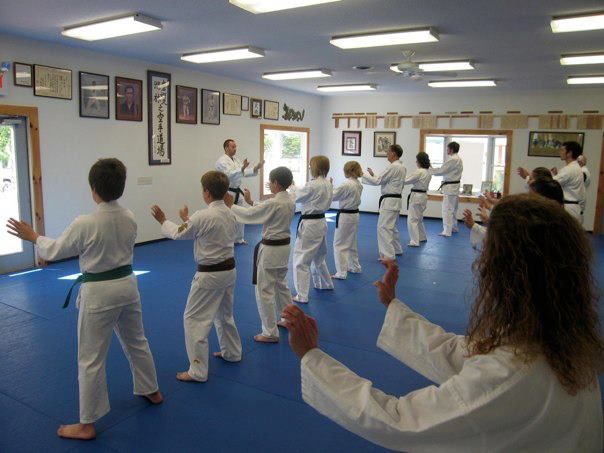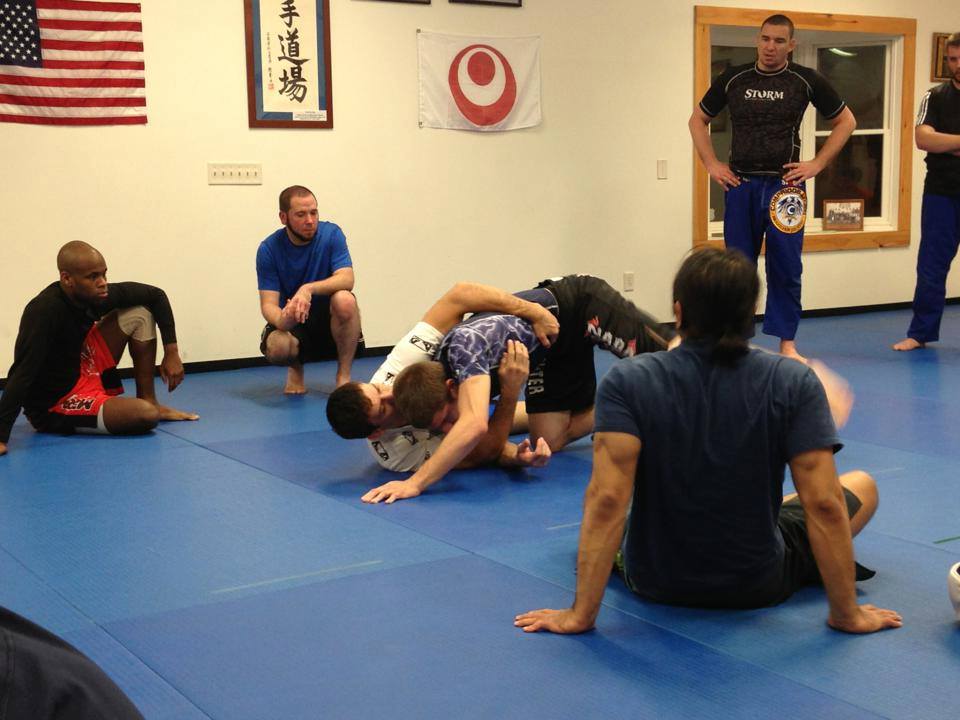
Many students do supplemental exercises to enhance their overall fitness. Done right, this can improve their performance in the martial arts, and even tend to prevent the occasional injury. Aside from practicing their art at home, we encourage students to cross-train in different arts, or even other sports and activities to enhance their fitness. This can be roadwork or treadmill time, bicycling, weight training, stretching or Yoga, hiking, etc.
Senior students and instructors also carry the responsibility of setting the example for others in the dojo on fitness and health, and representing their martial art and academy well. It important for them to perform their art on the highest levels and a high level of physical fitness is required to do this. Strength, speed, mobility, and even mental awareness are all better with a high level of physical fitness.
There is another side to physical fitness though that can actually be the hardest part. That is the food that we eat each day. Following a smart diet will keep our bodies healthy and in top condition for the demands of our chosen art(s). Conversely, bad eating habits or being reckless with diet can leave us struggling to perform well and mediocre results in our development. This gets more difficult as we get older. However, just like the training part, an intelligent approach

Nutrition Every living cell in our bodies needs fuel to function. Our bones, muscles, joints, skin, organs, and brain all depend on the food we put in our bodies. Nutritious food will have all of this working well and optimize their function. Good food will also help our bodies fight disease and injuries. Poor nutrition can also affect our mental health and attitude. Studies have shown that good nutrition tends to elevate our mood and minimize anxiety and depression. In addition to the classic ‘Food Pyramid’ shown on page 4, there are volumes of more specific information available online or at the library.
Portions One of the most important aspects of our diets is intelligent portioning. A diet of the most nutritious and healthy food will be sabotaged by excessive portions. The Okinawans have a practice that they call ‘Hara Hachi.’ This means stopping eating when their stomachs are eight-tenths full. Too often in the U.S. we eat until we’re ‘stuffed’ or completely full. It would be better instead to try to portion out an amount of food that will make us 80% full, and then avoid getting ‘seconds.’ We should also avoid feeling compelled to finish our food even though we’ve eaten enough.
Pace The speed or pace at which we eat meals can significantly influence our health. Eating too quickly is linked to poor digestion, increased calorie intake, and a higher risk of obesity and metabolic disorders. Eating more slowly allows for better digestion and absorption of nutrients, and it also gives our brain time to register feelings of fullness, which can prevent overeating and aid in bodyweight management. Slower eating also promotes mindful eating practices, contributing to overall better dietary habits and overall satisfaction after meals.
Drinks What we choose to drink also profoundly affects our health. Sugary beverages like sodas and energy drinks contribute to obesity, diabetes, and dental problems due to high sugar contents. Drinks high in caffeine, such as coffee and certain teas, can impact sleep quality and increase anxiety in excess. Alcohol beverages have high calories and cloud our judgement about all of the other aspects of our diet. On the other hand, moderate consumption of beverages like green and herbal tea can offer health benefits, including antioxidants and cardiovascular support. Consuming water regularly supports overall hydration, essential for bodily functions such as digestion, temperature regulation, and joint health.
Timing When we eat can also significantly impact our fitness and health. Eating at regular intervals helps regulate our blood sugar levels, which is crucial for preventing diabetes. Consuming meals earlier in the day aligns with our body's natural ‘circadian rhythms’, improving digestion and metabolic health. Late-night eating is associated with weight gain and poor sleep quality. Consistent meal timing can also enhance energy levels and cognitive function throughout our day.
Snacking One of the worst ways to go sideways from a healthy diet is unhealthy snacking. Processed foods and foods with high sugar, sodium, and other chemicals can sabotage an otherwise healthy diet. Instead consider snacks like: fruits, veggies, peanut butter and jelly, nuts or trail mix, yogurt, cheese, popcorn, jerky, and protein bars. Some of these things can be combined to make delicious treats that won’t destroy your other healthy food strategies.
Sweeteners Artificial sweeteners are low in calories, which can help people lose weight and control blood sugar. However, some studies suggest they might cause problems with our gut bacteria and make it harder to handle natural sweeteners like sugar. They can also cause some people to crave more sweet foods and eat more overall. Some people might also get stomach problems like bloating from them. Scientists are still learning about the long-term effects of these sweeteners, but moderate natural sweeteners are generally considered better for health and fitness.
Inflammation When dealing with injuries, short or long term, it’s important to know that certain foods can affect inflammation in our bodies. Eating a lot of sugary foods, fried foods, and red meat can increase inflammation, which can make injuries worse and lead to long-term health problems like heart disease and arthritis. On the other hand, foods like fruits, vegetables, nuts, and fish can help reduce inflammation because they have nutrients and antioxidants that protect our cells.
Health Issues Certain health conditions can affect our fitness levels. For example, asthma can make it more difficult to breathe during exercise, and arthritis can cause joint pain making it difficult to move. Heart conditions might limit how much physical activity someone can do safely. Diabetes can cause blood sugar levels to drop or spike during exercise, requiring careful management. These conditions can make staying fit more challenging, but with the right treatment and adjustments, people can still find ways to stay active and healthy. Eating a healthy diet is even more important with these conditions because it can help manage them properly. For instance, a balanced diet can not only reduce inflammation, but also provide us with more energy, and help us maintain a healthy weight making it easier to stay active and fit.
Cheat day A "cheat day" is when you take a break from your healthy eating plan and enjoy your favorite treats. This can be important because it helps you stick to good eating habits in the long run by giving you something to look forward to. It can also keep you from feeling deprived and make it easier to stay motivated. Just remember to enjoy your cheat day in moderation so you don't undo all of your eating discipline and hard work.
So, with some intelligent eating practices we can address the ‘hard part’ of our fitness and health journey, optimize our martial arts, and live a long and happy life. Happy eating!



 RSS Feed
RSS Feed